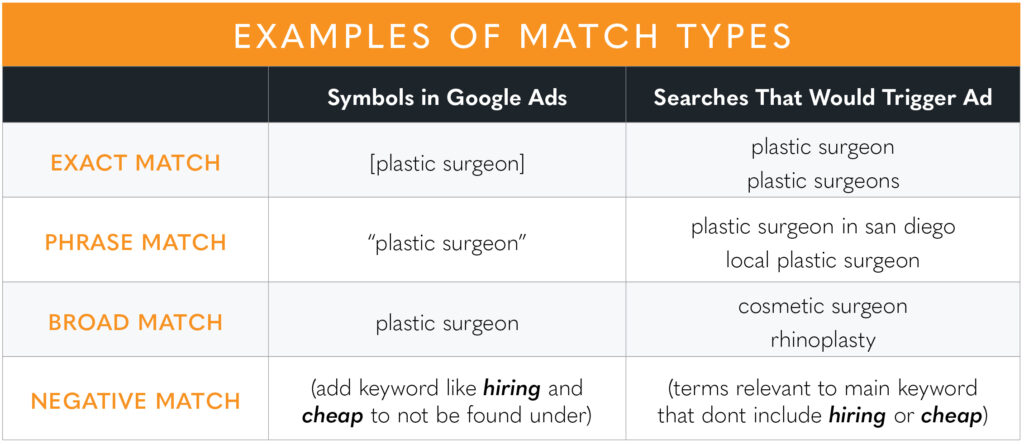The 4 Types of Keyword Matches on Google Ads

Google Ads—formerly called AdWords—can be a valuable tool for directing people’s attention to your practice and at the most opportune time: when they’re searching for the services you offer. To make your Google Ads campaigns as effective as possible, you must first understand the nature of keywords and the different match types you can assign to them.
What Is a Keyword in Google Ads?
In an advertising context, keywords are specific words, sets of words, or phrases that can be assigned to ads in order to ensure they are being shown to the most relevant audience. By contrast, a search term or query is the precise word, phrase, or question that a user types into the search bar.
When a Google user types in a search query that aligns with the keywords designated for a specific ad, then that ad may be shown as a part of the user’s search results. For example, if a plastic surgeon is running an ad campaign aimed at connecting with new patients, they might set one of their ad keywords as “plastic surgeon.” Alternatively, if a dentist wants to bring in more dental implant cases, they might target keywords such as “dental implants,” “All-on-4®,” or “tooth replacement.” From there, an advertiser must select a “match type” for each keyword.
What Are the Different Keyword Match Types in Google Ads?
Simply put, a match type assigns parameters for each keyword to control how relevant an Internet user’s search query must be for Google to show your ad in the results.
For every keyword added to your Google Ads account, it is possible to choose one of four different match types: exact, phrase, broad, broad, or negative. Depending on the type you select, your ad will pop up in Google results when a person searches for a query that is either specifically or more broadly related to your keyword.
If you choose a highly targeted match type, such as an exact match, the people seeing your ads are searching for exactly what you are advertising, meaning that, your ad will be more relevant. On the other hand, if you choose a more general match, such as a broad match, more people will see your ad, but a smaller portion of this audience will find your ad relevant.
In other words, the more targeted your keyword match is, the fewer searches that will apply (and smaller the audience). Conversely, the less targeted your match type is, the more searches that will apply (and greater your reach). Finding the proper balance between reach and relevance is often the key to maximizing your pay-per-click return on investment. Learn more about each of the Google Ad keyword match options in the numbered sections below.

1. Exact Match
An exact match is the most specific of all types. When this is applied, your ad will only show if the person is searching for your exact keyword—or a very close variation of it, such as misspellings, singular and plural forms, stemmings, acronyms, and abbreviations. If the exact words are used in the search query but in the wrong order (or if the search includes extra words), the ad will not be triggered.
Examples for [plastic surgeon]: plastic surgeon, plastic surgeons
2. Phrase Match
A phrase match is more flexible than an exact match, but still highly targeted. When this parameter is applied to an ad, a person can search for a phrase that includes either your keyword or a close variation that shares its meaning. As of 2021, the broad match modifier match option was discontinued, and much of its functionality was rolled into phrase match, allowing for greater flexibility in wording so long as the essential meaning of a user’s query—as determined by Google—matches the ad keywords.
Examples for “plastic surgeon”: plastic surgeon in san diego, local plastic surgeons
3. Broad Match
A broad match offers the most reach with the least relevancy. Not only will your keyword match for search terms that are close variations, but it may also match with completely different queries that are deemed relevant by Google Ads. This means your entire keyword does not even need to be within the search query. As a result, selecting broad match can sometimes waste a Google Ads budget, which is why it should be used sparingly—usually with the addition of negative keywords. Broad match is the default setting for your keyword if you do not choose otherwise.
Examples of broad matches for plastic surgery: cosmetic surgeon, rhinoplasty
4. Negative Match
A negative match is used to prevent your ad from displaying for irrelevant search queries that may seem similar. By using negative keywords, you can hone in on terms you want to prevent from triggering your ad, contributing to your return on investment.
Example terms for plastic surgery practices: cheap, cheapest, advertising, hiring, salary
Choosing the Right Match Types for Your Keywords
The right match types for your keywords will depend upon different factors, such as your Google Ads budget and goal of your campaign. As you move forward with a specific match type for your keyword, make sure you are tracking your Google Ads campaign to ensure you are adapting your strategy to reach your objectives. Rosemont Media also offers additional diagnostic tools, such as advanced call tracking with DNI, to provide further insight into the success of your digital marketing campaigns.
If you aren’t sure how to get started with Google Ads, or you want to make your existing campaigns more effective, our team at Rosemont Media can help. Our specialists have years of Google Ads experience and an established track record for creating Google advertising campaigns that help practices gain greater online visibility and achieve increases in relevant traffic. In fact, Rosemont Media is a Google Partner, which indicates our team’s advanced level of expertise. Our digital gurus have been trained, certified, and deemed trustworthy by Google. Furthermore, we understand the unique needs of elective healthcare practices, so you can rest assured that you are working with a marketing agency that specializes in your field.
Ready to make the most of Google Ads? Contact Rosemont Media today to speak with one of our experienced professionals about how to maximize your ROI.
Editor’s note: The original version of this post was published on September 27, 2016.